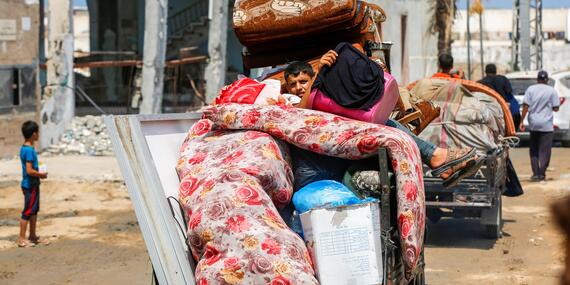Today's top news: Occupied Palestinian Territory, Haiti, Libya, Mali

Occupied Palestinian Territory
OCHA says an estimated 250,000 people have been internally displaced since 22 July alone, following the latest Israeli evacuation orders. This is more than 11 per cent of Gaza's population.
Since October, 90 per cent of Gaza’s population has been displaced, often many times.
OCHA has observed the return of thousands of people into parts of Khan Younis today. This includes central and eastern neighbourhoods in the city, as well as the adjacent area of Bani Suhaila. Their return follows the announced completion of ground operations by Israeli forces in those areas overnight.
OCHA is concerned about the impact that repeated evacuation orders are having on civilians in Gaza. Families are often having to relocate under fire, with only what they can carry.
Each time their lives are upended, they are forced to start over again in areas that lack basic services. They must seek out new sources of water, food and health care; identify safe places to sleep; and locate facilities to attend to their hygiene needs.
Many displaced families are staying in overcrowded makeshift shelters or tents in urgent need of repair. Others have returned to destroyed buildings, where they are sleeping amid trash and debris.
The UN Development Programme warns that Gaza’s solid waste management system has collapsed. In a new assessment, UNDP says there is no access to major landfills, and waste is accumulating at more than 140 temporary dumping sites. This is causing serious environmental and health risks, including a spike in diarrheal illness and acute respiratory infections.
Meanwhile, the UN Relief and Works Agency for Palestine Refugees in the Near East says between 800 to 1,000 new hepatitis A cases are being reported weekly from the agency’s health centres and shelters across Gaza. The lack of water, sanitation and hygiene is speeding the spread of diseases.
Haiti
OCHA and partners are concerned about the impact of the persisting insecurity in Haiti on access to schools, with the school year set to start in September.
At least 919 schools are closed in the Ouest and Artibonite departments, affecting some 156,000 students. In the Ouest Department, which includes the capital Port-au-Prince, 39 schools are serving as sites for displaced people, while at least 20 other schools are being occupied by armed groups.
Last week, Education Cannot Wait, the UN’s fund for education in emergency and crisis situations, allocated US$2.5 million to support schooling efforts in the country, notably in Ouest and Artibonite.
The UN continues to call for support to the ongoing crisis in Haiti. Seven months into the year, the $674 million Humanitarian Response Plan is only 25 percent funded, with $170 million received.
Libya/CERF allocation for Sudan refugees
Acting Emergency Relief Coordinator Joyce Msuya has allocated $5.3 million from the Central Emergency Response Fund to support some 195,000 vulnerable refugees and host communities in Libya, where the number of Sudanese refugees has increased significantly since the start of the conflict in April of 2023.
This allocation will support urgent life-saving assistance and kick-start humanitarian response while further resources are being mobilized.
The funding is part of the broader Regional Refugee Response Plan for the Sudan crisis coordinated by UNHCR, now including Libya and Uganda, with aid partners seeking $1.5 billion to support those affected by the conflict. This plan remains very underfunded: So far, only $313 million has been received, just 21 per cent of the total ask.
More than 15 months of conflict has forced a fifth of Sudan’s population to flee. This includes more than 2.1 million people who have crossed into neighbouring countries.
Mali
Floods have affected the central part of Mali. Last week, torrential rains hit the Bla area of Segou Region, causing significant flooding. More than 8,000 people have been affected by the rains and the flooding, which have also caused substantial material damage.
Local authorities have activated an emergency relief plan and have started registering affected families to receive assistance from the Government.
Humanitarian partners are working to support the Government-led response and are mobilizing to provide food assistance and cash transfers. They are also distributing tents, blankets, mosquito nets, and hygiene and sanitation products.
A Government-led mission with our partners to the affected area is under way now to assess the damage and the needs.
